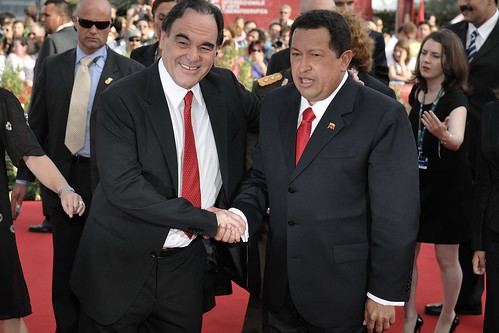
66à �me Festival du Cinà �ma de Venise (Mostra), 6à �me jour (07/09/2009) by nicogenin
For anyone wondering what the way out of struggles in America may be, director Oliver Stone's documentary, South of the Border, is a conversation starter. It's a film with the potential to push Americans to assess not only the way the U.S. acts and behaves toward Latin America but also how Americans are expected to reject the social movements of Latin America.
This documentary, written by Mark Weisbrot, co-director of the Center for Economic Policy and Research (CEPR), and Tariq Ali, author of Pirates of the Caribbean: Axis of Hope, shows how much of the continent has been raised out of poverty and thrown off agendas of privatization promoted by world organizations like the International Monetary Fund (IMF). Simultaneously, it challenges media representations of Latin America in the U.S. media.
The film opens with a clip from the show Fox & Friends, which airs on Fox News. The clip shows a conversation that the show's hosts--Steve Doocy, Brian Kilmeade, and Gretchen Carlson--had over Hugo Chavez, leader of Venezuela, and his use of coca leaves. The hosts liken Chavez's use of the leaves to the use of cocaine, suggesting cocaine comes from the leaves, and caricaturize him as a drug addict even though the leaves are not cocaine. The media misrepresentation serves as a launch pad into the first stop on Stone's road trip through South America, which is Venezuela.
Stone spends more time in Venezuela than in the other countries featured in the film. That's because Venezuela has really been the catalyst for the leftist and left-leaning social movements that have sprung up and made South America a continent of people willing to fight for an alternative way forward in the world. It's also because, as Stone highlights in the film, the U.S. was involved in a coup in 2002, which sought to remove Hugo Chavez from power and replace him with someone more suitable to America and other world organizations like the IMF.
After Venezuela, Stone's trip leads him to meet Evo Morales in Bolivia, Cristina Kirchner and her husband and former president Nestor Kirchner in Argentina, Lula da Silva in Brazil, Fernando Lugo in Paraguay, Rafael Correa in Ecuador, and Raul Castro in Cuba. His access to these leaders appears to be virtually unlimited and the leaders comfort around him appear to be at a level which allows them to speak very openly about the countries they lead and their country's relationship with the U.S.
Stone adds some very nice flourishes to many segments in the countries. With Chavez, he asks him to get on a bike and remember what it was like when he was a boy. He asks Morales to show him how to consume coca leaves (which when chewed release a stimulant and help people deal with the effects of the high altitude in Bolivia) because he and his crew are having trouble adapting to the altitude. He asks Cristina Kirchner about how many shoes she has (and she challenges Stone by saying something about how you'd ask a woman about shoes but you'd ask a man about something else of more importance).
The role of Cuba in the film is interesting. Stone wants to place a lot of credit in the hands of Cuba and denote the country's leaders as responsible for influencing many of the social movements in South America. Raul Castro is reluctant to take that credit. He does, however, outline three things he thinks Obama must do in relation to Latin America: end the embargo on Cuba, bring peace to the Middle East, and welcome Chavez to the U.S.
(Note: You can view every article as one long page if you sign up as an Advocate Member, or higher).





